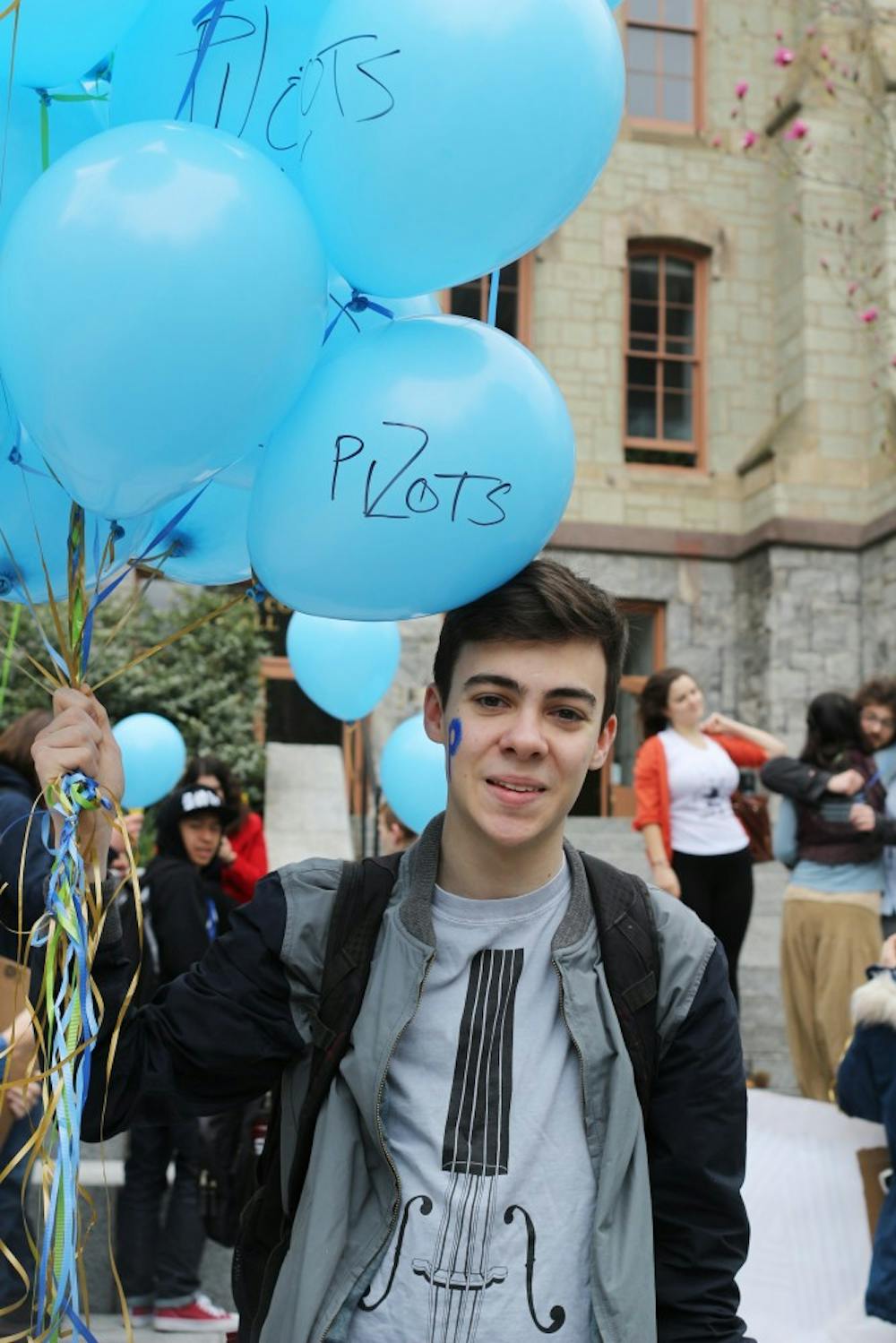
Amidst megaphones and blue balloons, nearly fifty members of the Student Labor Action Project marched on April 14 for Penn to pay PILOTs.
SLAP has spent nearly all year calling for the University to pay PILOTs, or payments in lieu of taxes. These voluntary payments would go to the School District of Philadelphia, which faces a $80 million deficit this year.
Under Pennsylvania state law, nonprofits like Penn are exempt from paying property taxes — which generally go to the school district.
The march began at noon outside of 1920 Commons. Protestors paraded past confused tour groups while holding signs saying “Fair Share Philly” and “PILOTs for a Better Philadelphia.” One student even held up a makeshift cardboard check for $6.6 million from Penn to the school district.
Along the way, the marchers chanted phrases like “Pay your share, it’s just fair, hey Gutmann, won’t you meet us there?”
After walking past College Green and into the Perelman Quadrangle, the march ended on the steps outside Claudia Cohen Hall.
College senior and SLAP member Chloe Sigal spoke to members and curious observers after the march ended.
“We are, after all, the civic Ivy. We should be leading on this issue, not exacerbating the issue,” she said.
Sigal also spoke about the 24 schools closed by the school district in the fall of 2013. One of these schools, Wilson Elementary, had a partnership with Penn through the Riepe Mentors Program, where freshmen in a residential program at Riepe College House tutor at the school, and Community School Student Partnerships, a tutoring program at the Netter Center.
Sigal, a former tutor at Wilson, was “heartbroken” to see her students’ school shut down.
Other marchers also spoke passionately about their desire for Penn to pay PILOTs.
“I’ve always thought that education is a tool for lifting people out of poverty,” College freshman and SLAP member Ilan Gold said.
Coming from New York City, another city fraught with battles over education funding, Gold recognized the need for greater support of Philadelphia district schools. “PILOTs really spoke to me,” he said.
For other SLAP members, the call for PILOTs is consistent with the University’s mission to foster engagement with the community.
“When we talk about Philadelphia, we talk about Penn being a good neighbor. I think [PILOTs] is the most structural way for us to affect change,” College and Wharton junior and SLAP member Aashna Desai said.
University administrators have staunchly denied the need for PILOTs. Vice President of the Office of Government and Community Affairs Jeffrey Cooper, who was unavailable to speak for this article, has previously spoken out against the way in which Penn has been singled out to pay PILOTs.
“The issue of PILOTs relates to the nonprofit sector broadly and not Penn specifically,” he said to The Daily Pennsylvanian in March.
Cooper also mentioned Penn’s nearly $1 million commitment to the School District though its involvement with programs and staff at the Penn Alexander School and other community-affiliated schools.
Penn officials have also cited the University’s $85 million payment in wage taxes to the city as evidence of a further financial commitment.
Local activist groups, including SLAP and its parent organization, Philadelphia Jobs with Justice, have targeted the campaign for PILOTs specifically at Penn.
College sophomore and SLAP member Devan Spear even testified in front of the Philadelphia City Council before the Council voted to approve a non-binding resolution asking “mega-nonprofits” in the city to pay PILOTs.
After the resolution’s passage, Mayor Michael Nutter expressed his ambivalence toward the topic. He told The Philadelphia Inquirer that PILOTs were not a “kind of sustainable, long-term, serious form of funding that our school system needs.”
Philadelphia JwJ has also targeted Penn specifically through the hashtag #UPennFairShare and in an open letter to Penn President Amy Gutmann, which was signed by seventeen local advocacy groups in March.
SLAP members cite Penn’s status as the wealthiest nonprofit in the city, whose budget exceeds the city’s own budget, as further reason for the University to make PILOT payments.
“Penn does have the money to be able to fund PILOTs,” Desai said.
Despite growing support community-wide and in the City Council, calls for PILOTs have appeared to come to a stop with Nutter and Penn officials. The looming Democratic primary for mayor could upset one of those obstacles.
Three of the prominent Democratic candidates for mayor — Jim Kenney, Doug Oliver, and Nelson Diaz — have expressly noted the need for PILOT payments.
In a policy paper released in March, Kenney — a former instructor at the Fels Institute of Government — cited PILOT agreements under former Mayor Ed Rendell’s administration and in Boston as models for a new PILOTs program with city nonprofits.
According to the policy paper, “Jim believes that many of these institutions, especially the larger nonprofits, have benefitted from City services, and can and should be contributing more.”
Support for PILOTs may soon eclipse City Hall, but as of yet, its supporters remain holding up signs and balloons outside of College Hall.
The Daily Pennsylvanian is an independent, student-run newspaper. Please consider making a donation to support the coverage that shapes the University. Your generosity ensures a future of strong journalism at Penn.
DonatePlease note All comments are eligible for publication in The Daily Pennsylvanian.





